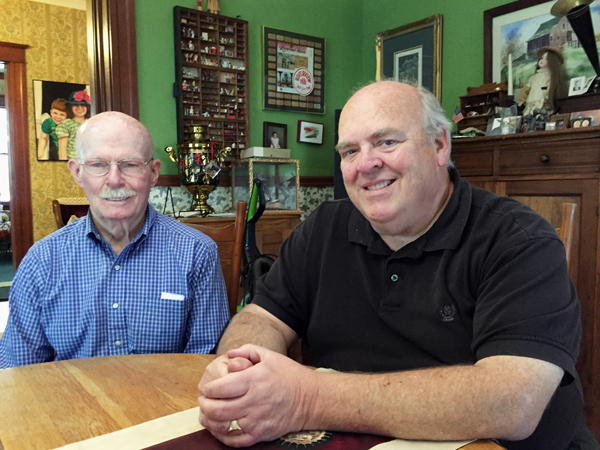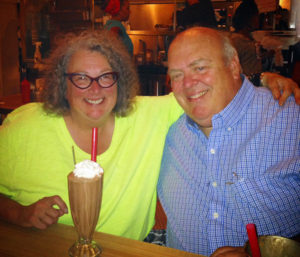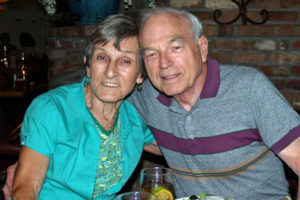By Barb Arland-Fye
The Catholic Messenger
An estimated 65,000 Iowans live with Alzheimer’s disease or related dementia. Many have family members, such as a spouse or children, who serve as their caregivers. They are people like Thom Hart, Frank Wessling and Henri Chapdelaine — each of whom served as a caregiver for a spouse with memory loss.
Earlier this year, the three shared their stories with the Grief Support Group of St. Anthony Parish in Davenport. “We all had different, but similar stories,” Thom recalled. “One of the abiding things — it made us more gentle people.”
“Be Not Afraid,” is the theme for this Respect Life Month, which continues through October. That theme encapsulates the faith journey of these three men, now widowed, as they traveled with their wives through the unchartered waters of memory loss. As steadfast Catholics, they clung to the “anchor of hope” that Cardinal Timothy Dolan spoke of in this year’s Respect Life Message.
“You have to listen for meaning behind the words.”
Frank and Mary Ann, members of St. Paul the Apostle Parish in Davenport, were married 63 years and had seven children and 19 grandchildren. Mary Ann died Jan. 16 at home, just two weeks shy of her 86th birthday.

Frank Wessling, left, and Thom Hart share stories of being caregivers for their spouses with memory loss. Not pictured in Henri Chapdelaine who also shared his story.
One of Frank’s fondest memories from his marriage involved the wedding of their daughter, Patti. “She got married here in town. We had no money, but all kinds of help from friends to make a wedding breakfast. We had Mary Ann’s wedding dress altered so Patti could wear it.” Afterwards, “we were sitting on the steps of our house … I had this great sense of fullness. That experience had been so good in so many ways. We were so grateful about everything.”
In the years before her death, Mary Ann had a stroke which affected her throat and made swallowing difficult. Four or five weeks into therapy, Frank remembered the therapist asking him if he had noticed anything else going on before Mary Ann’s throat problem. That conversation caused Frank to be more observant. Later, “I realized we had to see a neurologist.”
During the neurological examination, “she wasn’t able to answer anything. It was as if a key had turned off in her mind.” Mary Ann couldn’t remember her name, birthday or the names of her children. The neurologist’s assessment: Alzheimer’s.
“That shook me,” said Frank. “I knew that another phase of our marriage was under way.” He wrote to their children who weren’t in town: “I have lost my life companion.” But, “I turned out to be wrong about that. At the time that’s what I felt. I didn’t know what was coming, but I knew something important was over.”
Mary Ann never acknowledged the limitations caused by her memory loss. “She thought she could do anything …and then she couldn’t,” Frank remarked. “I can only imagine that has to be hard.” He listened to her repetitious questions and tried to assuage her anxiety about their relationship. But he also delighted in her childlike joy at seeing vistas as if for the first time and her appreciation for people with whom she had a special relationship.
The “mistake” he regrets most had to do with Mary Ann’s insistent request to see her mother, who had been dead for about 20 years. In response, Frank decided to take Mary Ann to Omaha to visit her parents’ graves. A sister-in-law joined them for the outing. But “Mary Ann was just looking, not saying a word … and that was it and we left.” He realized later that he had misunderstood his wife’s underlying request. “She wanted what her mother gave her. Instead of understanding and listening to that and giving her a hug …and holding her, I took (her statement) literary. It is an easy thing to do with people in that condition,” Frank said. “You have to listen for meaning behind the words.”
Frank said he has always taken his faith seriously. His journey with Mary Ann emphasized the sacrificial nature of love, and a deeper appreciation for fidelity. “In Scripture we read that God is love. I got a new revelation of what that means,” Frank said.
“It’s much more important to be kind than correct”
Thom and Jane, members of St. Anthony Parish in Davenport, were married 38 years and had two children. Jane died at age 63 on Oct. 28, 2014, at home. “I loved her intellect and her optimism,” he said wistfully.

One of Thom’s fondest memories of his marriage involved an election upset when he was seeking re-election as mayor of Davenport. “The night we lost the election was surreal. You’ve basically gotten fired. Reporters are all around you … the returns had been in maybe a half-hour. The TV cameras were there. I’m about to go on the 10 o’clock news and Jane whispers in my ear, “I think our marriage could have withstood another term or two, but I’m glad it doesn’t have to.” Public office is hard on families and marriages, Thom observed. After Jane’s whispered encouragement, “I thought, ‘OK, that puts it in perspective. The future is going to be OK.’”
After Thom left politics, he become involved in economic development and commuted for a while between Davenport and Des Moines. That’s when he began noticing a change. “To me it was a lot of subtle things,” Thom recalled of Jane’s memory loss. Her basic personality, enthusiasm and interaction didn’t change, however. “She’d say, ‘Can we go out to dinner tonight?’ And I would say, sure … but she couldn’t name any places. She’d say, ‘Honey, I want to go where you want to go.’ That’s not Jane,” Thom laughed.
Jane’s anxiety turned to concerns about needed repairs around the house that had been neglected while Thom commuted to work. He wanted to know the top three things that she wanted done. She identified a new roof, a redo of the kitchen floor and tuck-pointing of the chimney.
“The next day we had the same conversation,” Thom said. Jane didn’t remember the conversation.
Toward the end of her life, Jane insisted that she and Thom move to Chicago, her hometown. Thom relented, and they rented a small apartment in Chicago while keeping their home in Davenport. He recalled one afternoon that after they returned home from lunch, Jane asked if they could go out for lunch.
“We developed a saying, the kids and I,” said Thom, choking up. ‘“It’s a lot more work to be kind than to be correct.’” He laughs recalling the exasperation he felt, and the urge to correct her misconceptions of reality. Sometimes, he did because it was necessary. But, “It’s much more important to be kind than correct.”
“Mass and prayer have been important to me throughout my life,” Thom reflected. “You rely on that much more in times of stress. I think my faith was really important in dealing with that. In some ways, I felt very honored to have been able to serve her like that.”
“Is that me?”
Henri and Lillian, also members of St. Anthony Parish in Davenport, were married 64 years and had six children. Lillian died at age 83 on Dec. 19, 2016.
One of Henri’s fondest memories is “when I saw her walking down the aisle toward me. I can remember looking at her and thinking that this was the only time in my life that I was sure I was doing the right thing.”

Lillian began experiencing memory loss for about seven years before her death, but Henri suspects he may have missed some earlier signs. She loved to sew and used to sew all of her daughters’ clothes, he said. But then she forgot how to sew. So he took up sewing, simply trying to keep her engaged in an activity that he knew she loved. The same thing applied to gardening. “I had to start learning names of flowers because I could see that she was forgetting or hesitating to name certain flowers.” She loved the outdoors and camping and hiking with the kids. “She’d take the kids into the woods and teach them about the flowers. She was really an outdoors person,” Henri recalled.
He tried to teach her French because both of them had French backgrounds. “It was like reaching back into her past, so she could remember things,” Henri said. Friends continued to take her to book club, but worried that she might not be getting anything out of it. He told them it kept his wife socializing and gave him a break.
Lillian moved into Grand Haven Retirement Community in Eldridge after breaking her pelvic bone. One day, while a nursing assistant was helping Lillian get dressed, “Lillian was looking into the mirror and kind of walking back and forth,” Henri recalled. “She said, ‘This old lady is following me. She’s moving everywhere I’m moving.’ The nursing assistant said, ‘Lillian, that’s you.’ And Lillian said, ‘Me? What happened to me?’ And I said, ‘Lillian, we grew old.’”
Henri visited Lillian six days a week, three to four hours a day. “I had butterflies in my stomach because I didn’t know if she would be in a good mood or a bad mood,” he said. A hospitalization required him to be away from Lillian for eight weeks. He was afraid that she would have forgotten him. “Are you really Henri?” she asked when he returned. “I grabbed her, hugged her and kissed her and then I said, ‘Now, do you know anyone else who would do that to you?’ But she hadn’t forgotten my name.”
Faith in God carried him through the journey, he said. But as she continued to suffer falls, “I was praying for God to take her because I didn’t want to see her suffering.” Photos of Lillian line the walls of his home. “I know she’s in heaven. I just hope she’s there to help me get through the door.”
Alzheimer’s Association reaches out
Parishes need to identify the people in their own congregations that are impacted by Alzheimer’s disease and related dementia, says Jerry Schroeder, program specialist with the Greater Iowa Chapter of the Alzheimer’s Association.
“Reach out to these people and help connect them to support groups, physicians and other resources.” And then follow up. Offer educational seminars; invite speakers such as Schroeder to give a talk.
People dealing with memory loss, and their loved ones, need to know they are not alone. For more information, call the Alzheimer’s Association hotline at 800-272-3900 or visit the website at www.alz.org.
“Hope is possible because other people understand what you are going through,” Schroeder said.











